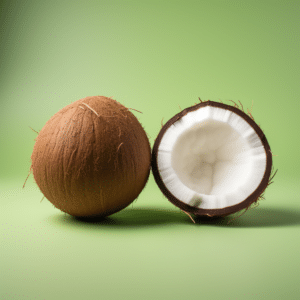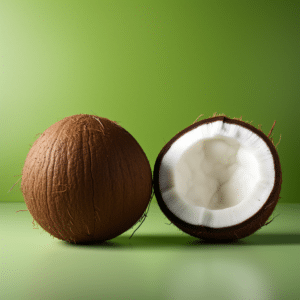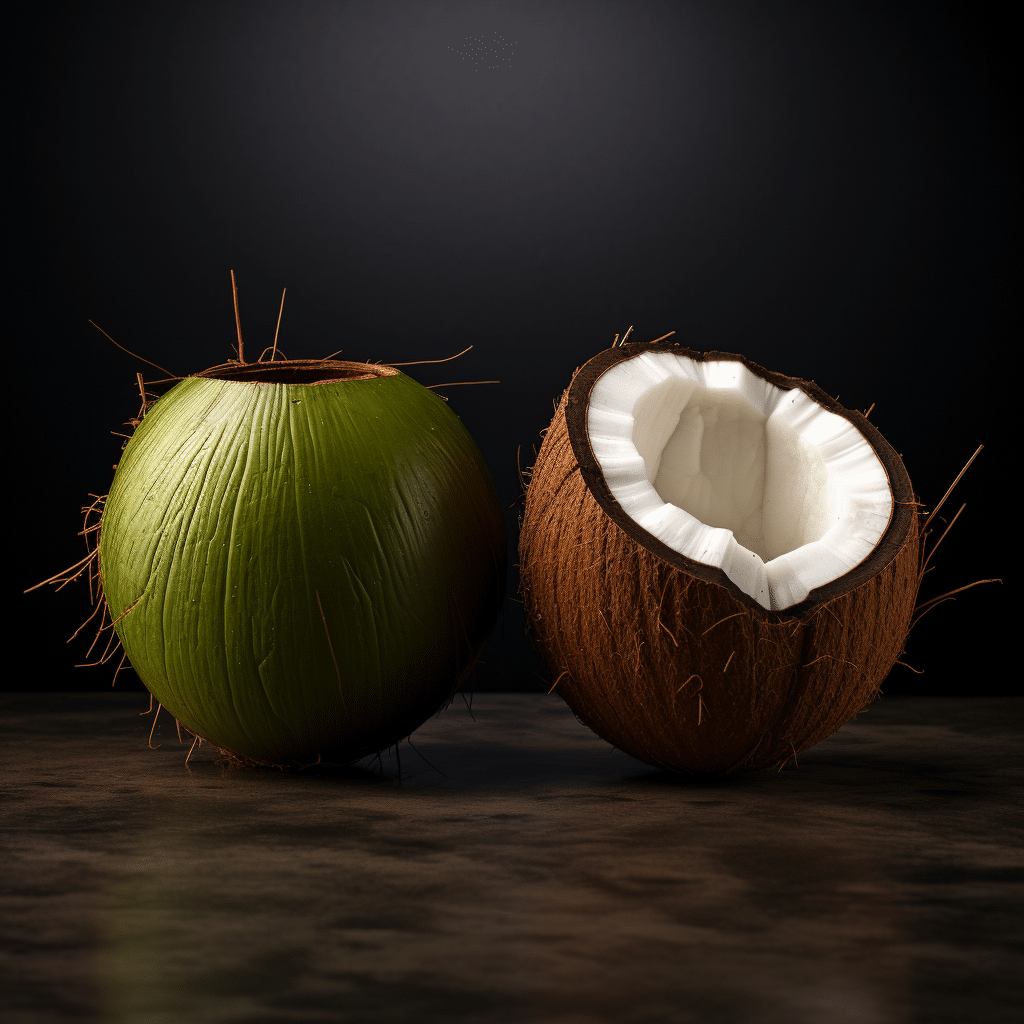Brown vs Green Coconut: Flavors, Uses, and Benefits
The brown and the green coconut are used for different cooking and baking purposes. They both offer their unique flavors and textures, yet they are also similar in many ways. However, many people confuse them, considering they offer diverse health benefits.
Some are left wondering which is better than the other and their differences. We compare the two types of coconuts in this article! Keep reading

Brown Coconut Vs Green Coconut: Overview
The Green Coconut
They Green coconut is a young coconut that has not yet fully matured. It is green in color since it contains chlorophyll, used in the synthesis of food. It has high-fat content, which is why it tastes sweeter than mature coconuts. Similarly, it has more water content than mature coconuts, with less meat.
Green coconut is used in different ways in both Western and Asian cultures. It is eaten as an ingredient in many dishes, mainly in Asia. In India, it is eaten raw or added to curries and other dishes to add extra zest. It can also be made into chutneys and pickles using mustard seeds and spices like asafetida and cumin seeds to enhance its flavor.
In Western countries, green coconut water is commonly used as an ingredient for ice cream and frozen yogurt flavors due to its flexibility.
Benefits of Green Coconut
Green coconut is an excellent source of health-promoting nutrients. It provides a wide range of vitamins, minerals, and antioxidants that can be beneficial in boosting your immune system, improving digestion, and promoting weight loss. Here are some of the benefits;
Antimicrobial Properties
Green coconut contains antioxidants that have antimicrobial properties. Antioxidants help your body fight infections by neutralizing free radicals. Free radicals are unstable molecules that can damage cells in the body and cause premature aging and cancerous cell changes.
Vitamin C Content
Green coconut also has high levels of vitamin C, which helps boost immune systems and fight off infections. Vitamin C is also needed to form collagen and elastin, which support healthy skin, hair, nails, and bones.
Antioxidant Power
The antioxidants in green coconuts are powerful enough to protect against free radicals from damaging cell walls, DNA, and other parts of the body’s systems, such as the brain and heart.
Good for Skin and Hair
The oil extracted from the green coconut contains vitamin E and fatty acids, which are good for skin and hair. They keep your skin soft and smooth by nourishing it from within. Moreover, they make your hair shiny and healthy-looking by repairing damaged hair follicles.
Promotes Weight Loss
Green coconut water has been shown to help people lose weight by reducing their appetite while controlling their cravings for high-calorie foods like sugar-sweetened beverages.
Help Improve Heart Health
Green coconuts contain high amounts of magnesium, which helps lower blood pressure levels and reduce the risk of heart diseases such as heart attack.
Coconut butter also contains many other nutrients such as potassium, fiber, and zinc, which are known to improve cardiovascular health.
Brown Coconut
Brown coconut is a fully mature coconut fruit. It has a deep brown color and a smooth, elliptical shape. It is delicious and can be used to make various products such as milk, butter, and chocolate.
The brown coconut’s high-fat content makes it very useful for making delicious desserts, such as those containing brownies or cakes. The oil that accompanies the flesh of the fruit has been used in cooking for centuries because it makes foods especially tasty when added to dishes at the end of cooking time.
Brown coconuts are available in the markets throughout the year but are more commonly available from December to February.
Benefits of Brown Coconut
Brown coconut is rich in dietary fiber and helps lower cholesterol levels in the blood. The fat content in brown coconut is only 4%, making it suitable for people with high cholesterol issues.
Additionally, brown coconut oil is not only used for cooking but has been proven to have many health benefits as well. It is effective in fighting against infections while also preventing hair loss.
On the same note, a serving of brown coconut is rich in manganese, which is critical to bone health. Manganese is an essential mineral and has been shown to help reduce the risk of osteoporosis and bone fractures.
It is also rich in copper and iron. It provides a healthy dose of copper and iron, two important minerals for good health. Copper supports nerve function, while iron helps make red blood cells, which carry oxygen throughout the body.
And ofcourse, we cannot forget that brown coconuts have high levels of Vitamin E, which helps prevent free radical damage to cells and tissues.
Differences Between Brown and Green Coconut
There are many differences between brown coconut and green coconut. Foremost, they may differ in shell colors. Brown coconuts have darker shells, while green coconuts have lighter shells.
Similarly, brown coconuts contain high meat content compared to their green counterparts. They are typically mature with high fat and fibre content.
Needless to say, brown coconuts have thicker kernels, which makes them heavier and more difficult to crack open. They also tend to be large and oval. On the other hand, green coconut kernels are soft since they are immature and haven’t attained maximum growth.
Green coconuts tend to have more water than their counterparts. Ideally, they are harvested for the water, which is regarded as highly nutritious. So they are usually harvested when their water content is high, typically after seven months. In contrast, brown coconuts have less water which tends to be concentrated and fatty.
They also differ in husks. The husks of green coconuts are white and soft, almost fluffy, while those of brown coconuts are brown and much tougher. The brown coconut is more popular due to its sweeter taste and heavier texture, making it more filling and satisfying.

Bottom Line
Ultimately, either type of coconut will work fine. However, each has its unique set of health benefits. Brown coconuts have a higher fiber concentration and more overall nutrients than their green counterparts.
Green coconuts, on the other hand, are richer in vitamin C. But all in all, in the end, you will want to select whatever best fits your dietary needs.






